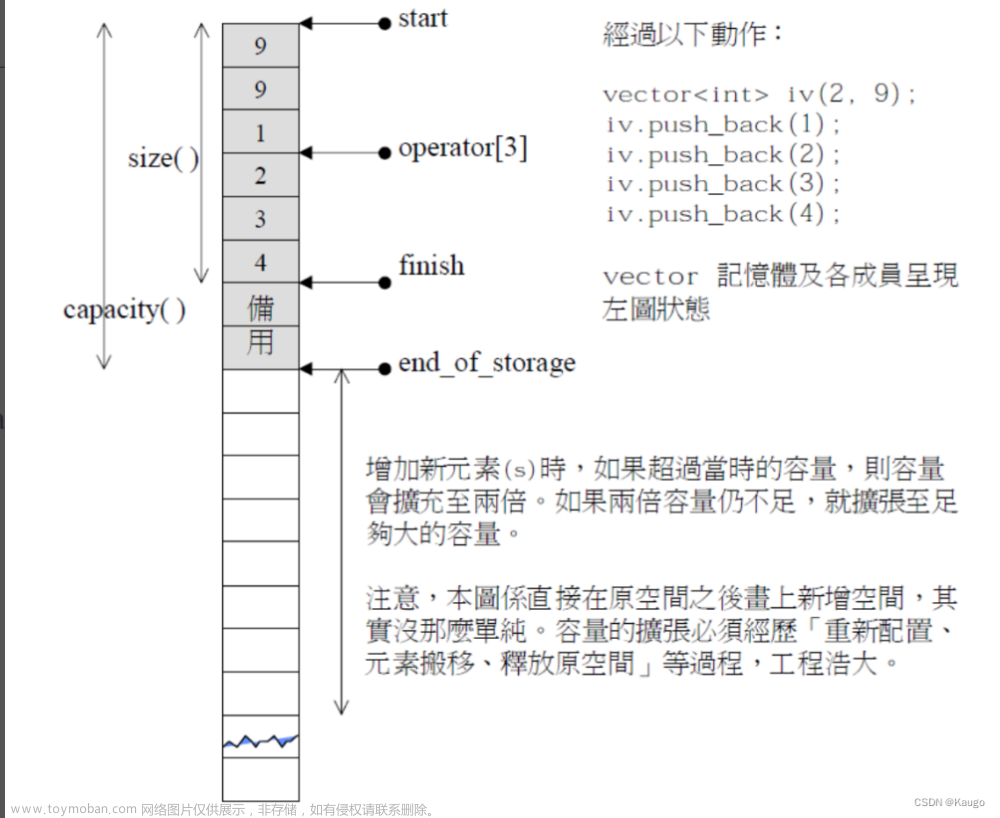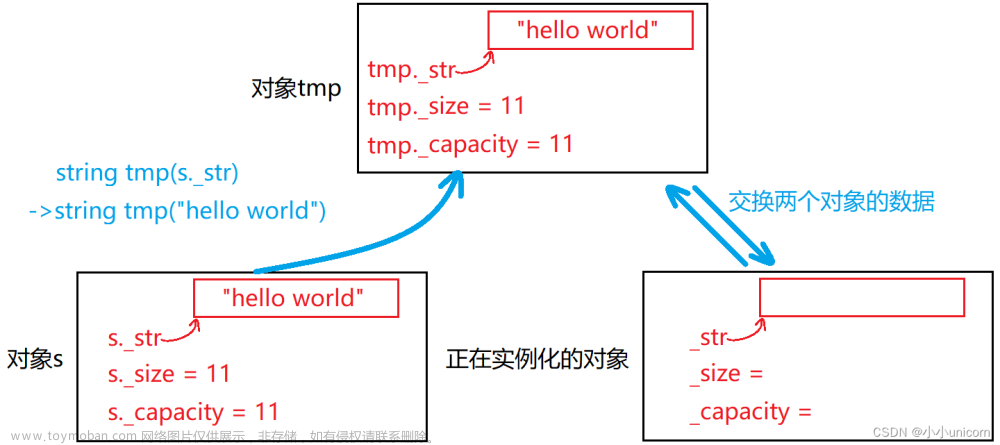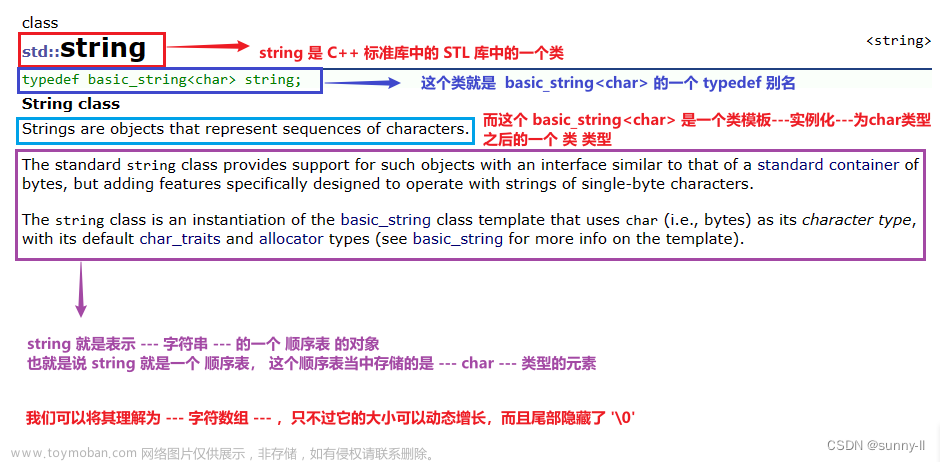
本篇博客仅仅实现存储字符(串)的string
同时由于C++string库设计的不合理,我仅实现一些最常见的增删查改接口
接下来给出的接口都是基于以下框架:
private:
char* _str;//思考如何不用const
size_t _size;
size_t _capacity;
//这样写可以
const static size_t string::npos = -1;
//下面这种写法也可以->和上述写法产生矛盾
const static size_t string::npos;
};
//静态变量只能在类外面定义 上述两种定义容易产生矛盾
📚1.string默认构造 | 析构函数 | 拷贝构造 | 赋值重载
//无参默认构造
string()
:_str(new char[1])
, _size(0)
, _capacity(0)
{
_str[0] = '\0';
}
//有参默认构造
string(const char* str="\0")//不能写'\0'
//->类型不匹配
:_size(strlen(str))
{
_capacity = _size;
_str = new char[_capacity + 1];
strcpy(_str, str);
}
C++string标准库中,无参构造并不是空间为0,直接置为空指针 而是开一个字节,并存放‘\0’
C++中支持无参构造一个对象后,直接在后面插入数据,也从侧面说明了这点
由于C++构造函数不管写不写都会走初始化列表的特性,所以这里也走初始化列表
string中,_capacity和_size都不包含空指针,所以带参构造要多开一个空间,用来存储’\0’
📚2.string类析构函数
~string()
{
delete[] _str;
_str = nullptr;
_size = 0;
_capacity = 0;
}
📚3.拷贝构造
string(const string& s)
{
_str = new char[s._capacity + 1];
strcpy(_str, s._str);
_size = s._size;
_capacity = s._capacity;
}
📚4.赋值重载
传统写法:
string& operator=(const string& s)
{
if (this != &s)
{
char* tmp = new char[s._capacity + 1];
strcpy(tmp, s._str);
delete[] _str;
_str = tmp;
_size = s._size;
_capacity = s._capacity;
}
return *this;
}
现代写法:
//法二
void swap(string& s)
{
std::swap(_str, s._str);
std::swap(_size, s._size);
std::swap(_capacity, s._capacity);
}
string& operator=(string tmp)
{
swap(tmp);
return *this;
}
📚5.iterator迭代器和基于范围的for循环
在C++中,范围for在底层是通过迭代器来实现的 所以只要实现了迭代器,就支持范围for
而迭代器类似于指针,迭代器可以被看作是指针的一种泛化,它提供了类似指针的功能,可以进行解引用操作、指针运算等
以下提供了const迭代器和非const迭代器:
typedef char* iterator;
const typedef char* const_iterator;
iterator begin()
{
return _str;
}
iterator end()
{
return _str + _size;
}
const_iterator begin() const
{
return _str;
}
const_iterator end() const
{
return _str + _size;
}
📚6.运算符重载operator[ ]
这里我们和库中一样,提供以下两个版本
//可读可写
char operator[](size_t pos)
{
assert(pos < _size);
return _str[pos];
}
//只读
const char operator[](size_t pos)const
{
assert(pos < _size);
return _str[pos];
}
char& operator[](size_t pos) const
{
assert(pos < _size);
return _str[pos];
}
bool operator>(const string& s)
{
return strcpy(_str, s._str) == 0;
}
bool operator==(const string& s)
{
return strcpy(_str, s._str) == 0;
}
bool operator>=(const string& s)
{
return *this > s || *this == s;
}
bool operator<(const string& s)
{
return !(*this >= s);
//return strcpy(_str, s._str) == 0;
}
bool operator!=(const string& s)
{
return !(*this == s);
}
这里我用了this指针指向的是private里面的数据 然后和s对象所对应的值作比较 能和strcpy函数联合起来用 能达到同样的效果 这是一个很不错的想法
📚7.容量相关:size | resize | capacity | reserve
size_t size()const
{
return _size;
}
size_t capacity()const
{
return _capacity;
}
在C++中,我们一般不缩容
所以实现reserve时容量调整到n首先判断目标容量n是否大于当前容量。如果小于就不做处理,否则先开辟n+1个内存空间(多出来的一个用于存储‘\0’),然后将原有数据拷贝到新空间strcpy会将’\0’一并拷贝过去然后释放就空间,并让_str指向新空间,同时更新_capacity
void reserve(size_t n)
{
if (n > _capacity)
{
char* tmp = new char[n + 1];
strcpy(tmp, _str);
delete[] _str;
_str = tmp;
_capacity = n;
}
}
当n<_size时,只需将下标为n的地址处的数据改为’\0’
其他情况,我们直接统一处理。直接复用reserve()函数将_capacity扩到n 然后用将[_size, n)中的数据全部初始化为ch 这里博主给ch一个初始值’\0’,但ch不一定为’\0’,所以要将下标为n处的地址初始化为’\0’
void resize(size_t n, char ch='\0')
{
if (n <= _size)
{
_str[n] = '\0';
_size = n;
}
else
{
reserve(n);
while (_size < n)
{
_str[_size] = ch;
_size++;
}
_str[_size] = '\0';
}
}
📚8.数据相关:push_back | append | operator+= | insert | erase
尾插:push_back
尾插首先检查扩容,在插入数据
void push_back(char ch)
{
//扩容
if (_size == _capacity)
{
reserve(_capacity == 0 ? 4 : _capacity * 2);
}
//插入数据
_str[_size] = ch;
_size++;
_str[_size] = '\0';
}
append尾部插入字符串
void append(const char* str)
{
size_t len = strlen(str);
if (_size + len > _capacity)
{
reserve(_size + len);
}
strcpy(_str + _size, str);
//strcat(_str, str);
_size += len;
}
operator+=()字符/字符串
operator+=()字符、字符串可以直接复用push_back和append
string& operator+=(char ch)
{
push_back(ch);
return *this;
}
string& operator+=(const char* str)
{
append(str);
return *this;
}
insert插入字符/字符串
下面给出各位初学者容易犯的错误:
void insert(size_t pos, char ch)
{
assert(pos <= _size);
//扩容
if (_size == _capacity)
{
reserve(_capacity == 0 ? 4 : _capacity * 2);
}
//挪动数据
size_t end = _size;
while (end >= pos)
{
_str[end+1] = _str[end];
end--;
}
_str[pos] = ch;
_size++
}
假设是在头插字符,end理论上和pos(即0)比较完后就减到-1,在下一次循环条件比较时失败,退出循环 但遗憾的是end是size_t类型,始终>=0, 会导致死循环
解决办法如下
从end从最后数据的后一位开始,每次将前一个数据移到当前位置。最后条件判断就转化为end>pos,不会出现死循环这种情况
void insert(size_t pos, char ch)
{
assert(pos <= _size);
//扩容
if (_size == _capacity)
{
reserve(_capacity == 0 ? 4 : _capacity * 2);
}
//挪动数据
size_t end = _size+1;
while (end > pos)
{
_str[end] = _str[end-1];
end--;
}
//插入数据,更新_size
_str[pos] = ch;
_size++;
}
insert插入字符串
void insert(size_t pos, const char* str)
{
int len = strlen(str);
if (_size + len > _capacity)
{
reserve(_size + len);
}
size_t end = _size+1;
while (end > pos)
{
_str[end + len-1] = _str[end-1];
end--;
}
strncpy(_str + pos, str, len);
_size += len;
}
erase
erase分两种情况:
从pos开始,要删的数据个数超过的字符串,即将pos后序所有数据全部情况 直接将pos处数据置为’\0’即可
从pos开始,要删的数据个数没有超出的字符串。所以只需要从pos+len位置后的所有数据向前移动从pos位置覆盖原数据即可
void erase(size_t pos, size_t len = npos)
{
//len==nppos意思是字串全部删除
if (len==npos || pos + len >= _size)
{
//有多少,删多少
_str[pos] = '\0';
_size = pos;
}
else
{
size_t begin = pos + len;
while (begin <= _size)
{
_str[begin - len] = _str[begin];
begin++;
}
_size -= len;
}
}
📚9.关系操作符重载:< | == | <= | > | >= | !=
bool operator>(const string& s)
{
return strcpy(_str, s._str) == 0;
}
bool operator==(const string& s)
{
return strcpy(_str, s._str) == 0;
}
bool operator>=(const string& s)
{
return *this > s || *this == s;
}
bool operator<(const string& s)
{
return !(*this >= s);
//return strcpy(_str, s._str) == 0;
}
bool operator!=(const string& s)
{
return !(*this == s);
}
📚10.find查找字符 | 字符串 | substr
size_t find(char ch, size_t pos = 0)
{
for (size_t i = pos; i < _size; i++)
{
if (_str[i] == ch)
{
return i;
}
}
return npos;
}
size_t find(const char* sub, size_t pos = 0)
{
const char* p = strstr(_str + pos, sub);
if (p)
{
return p - _str;
}
else
{
return npos;
}
}
strsub()模拟实现
strsub目标长度可能越界string,也可能还有没有。但不管是那种情况,最后都需要拷贝数据。所以这里我们可以先将len真实长度计算出来,在拷贝数据
string substr(size_t pos, size_t len = npos)const
{
string s;
size_t end = pos + len;
//目标字符越界string,更新len
if (len == npos || end >= _size)
{
len = _size - pos;
end = _size;
}
//拷贝数据
s.reserve(len);
for (size_t i = pos; i < end; i++)
{
s += _str[i];
}
return s;
}
📚11.流插入和流提取<< | >>
由于前面我们实现了迭代器,所以最简单的方式就是范围for
ostream& operator<<(ostream& out, const string& s)
{
/*for (size_t i = 0; i < s.size(); i++)
{
out << s[i];
}*/
for (auto ch : s)
out << ch;
return out;
}
流提取>>
流提取比较特殊。在流提取前需要将原有数据全部清空。同时由于>>无法获取空字符和换行符()(都是作为多个值之间的间隔),直接流提取到ostream对象中,没法结束类似于C语言中scanf, 换行符和空字符仅仅只是起到判断结束的作用,但scanf无法获取到它们
所以这里博主直接调用istream对象中的get()函数类似于C语言中的getchar()函数
class string
{
void clear()
{
_str[0] = '\0';
_size = 0;
}
private:
char* _str;
size_t _capacity;
size_t _size;
};
istream& operator>>(istream& in, string& s)
{
s.clear();
char ch;
//in >> ch;
ch = in.get();
while (ch != ' ' && ch != '\n')
{
s += ch;
//in >> ch;
ch = in.get();
}
return in;
}
📚12.完整代码
#define _CRT_SECURE_NO_WARNINGS 1
#include<iostream>
#include<vector>
#include<list>
#include<string>
#include<assert.h>
using namespace std;
namespace success
{
class string
{
public:
typedef char* iterator;
iterator begin()
{
return _str;
}
iterator end()
{
return _str + _size;
}
string()
:_str(new char[1])
, _size(0)
, _capacity(0)
{
_str[0] = '\0';
}
string(const char* str="\0")//不能写'\0'
//->类型不匹配
:_size(strlen(str))
{
_capacity = _size;
_str = new char[_capacity + 1];
strcpy(_str, str);
}
const char* c_str()
{
return _str;
}
string(const string& str)
:_size(str._size)
{
_capacity = str._capacity;
_str = new char[str._capacity + 1];
strcpy(_str, str._str);
}
char& operator[](size_t pos) const
{
assert(pos < _size);
return _str[pos];
}
size_t size()
{
return _size;
}
string& operator=(const string& str)
{
if (this != &str)
{
delete[] _str;
_str = new char[str._capacity + 1];
_size = str._size;
_capacity = str._capacity;
strcpy(_str, str._str);
}
return *this;
}
~string()
{
delete[] _str;
_str = nullptr;
_size = 0;
_capacity = 0;
}
bool operator>(const string& s)
{
return strcpy(_str, s._str) == 0;
}
bool operator==(const string& s)
{
return strcpy(_str, s._str) == 0;
}
bool operator>=(const string& s)
{
return *this > s || *this == s;
}
bool operator<(const string& s)
{
return !(*this >= s);
//return strcpy(_str, s._str) == 0;
}
bool operator!=(const string& s)
{
return !(*this == s);
}
void resize(size_t n, char ch = '\0');
void reserve(size_t n)
{
char* tmp = new char[n + 1];
strcpy(tmp, _str);
delete[] _str;
_str = tmp;
_capacity = n;
}
void push_back(char ch)
{
if (_size + 1 > _capacity)
{
reserve(_capacity * 2);
}
_str[_size] = ch;
++_size;
_str[_size] = '\0';
}
void append(const char* str)
{
size_t len = strlen(str);
if (_size + len > _capacity)
{
reserve(_size + len);
}
strcpy(_str + _size, str);
//strcat(_str, str);
_size += len;
}
void insert(size_t pos, char ch)
{
assert(pos <= _size);
if (_size + 1 > _capacity)
{
reserve(2 * _capacity);
}
size_t end = _size;
while (end >= pos)
{
_str[end + 1] = _str[end];
--end;
}
_str[pos] = ch;
++_size;
}
void insert(size_t pos, const char* str)
{
int len = strlen(str);
if (_size + len > _capacity)
{
reserve(_size + len);
}
size_t end = _size+1;
while (end > pos)
{
_str[end + len-1] = _str[end-1];
end--;
}
strncpy(_str + pos, str, len);
_size += len;
}
void erase(size_t pos, size_t len = npos)
{
//len==nppos意思是字串全部删除
if (len==npos || pos + len >= _size)
{
//有多少,删多少
_str[pos] = '\0';
_size = pos;
}
else
{
size_t begin = pos + len;
while (begin <= _size)
{
_str[begin - len] = _str[begin];
begin++;
}
_size -= len;
}
}
private:
char* _str;//思考如何不用const
size_t _size;
size_t _capacity;
//这样写可以
const static size_t string::npos = -1;
//下面这种写法也可以->和上述写法产生矛盾
const static size_t string::npos;
};
//静态变量只能在类外面定义 上述两种定义容易产生矛盾
void test_string1()
{
string s1("hello bit");
string s2("hello bit.");
cout << s1.c_str() << endl;
cout << s2.c_str() << endl;
s2[0]++;
cout << s2.c_str() << endl;
}
void test_string2()
{
string s3 = ("hello bit");
string s4("hello bit.");
cout << s3.c_str() << endl;
cout << s4.c_str() << endl;
string s5(s3);
cout << s5.c_str() << endl;
s3[0]++;
s4 = s3;
cout << s3.c_str() << endl;
cout << s5.c_str() << endl;
}
void test_string3()
{
string s1 = "hello bit";
string::iterator it = s1.begin();
while (it != s1.end())
{
cout << *it << " ";
++it;
}
cout << endl;
}
}
#include"string.h"
#include<Windows.h>
#include<iostream>
using namespace std;
int main()
{
try
{
success::test_string2();
}
catch (const exception& e)
{
cout << e.what() << endl;
}
success::test_string1();
success::test_string2();
success::test_string3();
//string a = "hello world";
//string b = a;//在用一个表达式中 构造+拷贝构造
//->编译器优化成一次构造
//a.c_str() == b.c_str()比较的是存储字符串位置的地址
//if (a.c_str() == b.c_str())
//{
// cout << "true" << endl;
//}
//else cout << "false" << endl;//案1
//string c = b;
//c = "";
//if (a.c_str() == b.c_str())
//{
// cout << "true" << endl;
//}
//else cout << "false" << endl;
//a = "";
//if (a.c_str() == b.c_str())
//{
// cout << "true" << endl;
//}
//else cout << "false" << endl;、
//string str("Hello Bit.");
//str.reserve(111);
//str.resize(5);
//str.reserve(50);
//cout << str.size() << ":" << str.capacity() << endl;
//str.reserve(111); //调整容量为111
//str.resize(5); //调整元素个数为5
//str.reserve(50); //调整容量为50,由于调整的容量小于已有空间容量,故容量不会减小
//所以size = 5 capacity = 111
//string strText = "How are you?";
//string strSeparator = " ";
//string strResult;
//int size_pos = 0;
//int size_prev_pos = 0;
//while ((size_pos = strText.find_first_of(strSeparator, size_pos)) != string::npos)
//{
// strResult = strText.substr(size_prev_pos, size_pos - size_prev_pos);
// cout << strResult << " ";
// size_prev_pos = ++size_pos;
//}
//if (size_prev_pos != strText.size())
//{
// strResult = strText.substr(size_prev_pos, size_pos - size_prev_pos);
// cout << strResult << " ";
//}
//cout << endl;
system("pause");
return 0;
}
// 为了和标准库区分,此处使用String
class String
{
public:
/*String()
:_str(new char[1])
{*_str = '\0';}
*/
//String(const char* str = "\0") 错误示范
//String(const char* str = nullptr) 错误示范
String(const char* str = "")
{
// 构造String类对象时,如果传递nullptr指针,可以认为程序非
if (nullptr == str)
{
assert(false);
return;
}
_str = new char[strlen(str) + 1];
strcpy(_str, str);
}
~String()
{
if (_str)
{
delete[] _str;
_str = nullptr;
}
}
private:
char* _str;
};
// 测试
void TestString()
{
String s1("hello bit!!!");
String s2(s1);
}

说明:上述String类没有显式定义其拷贝构造函数与赋值运算符重载,此时编译器会合成默认的,当用s1构造s2时,编译器会调用默认的拷贝构造。最终导致的问题是,s1、s2共用同一块内存空间,在释放时同一块空间被释放多次而引起程序崩溃,这种拷贝方式,称为浅拷贝
浅拷贝
浅拷贝:也称位拷贝,编译器只是将对象中的值拷贝过来。如果对象中管理资源,最后就会导致多个对象共享同一份资源,当一个对象销毁时就会将该资源释放掉,而此时另一些对象不知道该资源已经被释放,以为还有效,所以当继续对资源进项操作时,就会发生发生了访问违规
深拷贝
如果一个类中涉及到资源的管理,其拷贝构造函数、赋值运算符重载以及析构函数必须要显式给出。一般情况都是按照深拷贝方式提供
传统版写法的String类
class String
{
public:
String(const char* str = "")
{
// 构造String类对象时,如果传递nullptr指针,可以认为程序非
if (nullptr == str)
{
assert(false);
return;
}
_str = new char[strlen(str) + 1];
strcpy(_str, str);
}
String(const String& s)
: _str(new char[strlen(s._str) + 1])
{
strcpy(_str, s._str);
}
String& operator=(const String& s)
{
if (this != &s)
{
char* pStr = new char[strlen(s._str) + 1];
strcpy(pStr, s._str);
delete[] _str;
_str = pStr;
}
return *this;
}
~String()
{
if (_str)
{
delete[] _str;
_str = nullptr;
}
}
private:
char* _str;
};
现代版写法的String类文章来源:https://www.toymoban.com/news/detail-753754.html
class String
{
public:
String(const char* str = "")
{
if (nullptr == str)
{
assert(false);
return;
}
_str = new char[strlen(str) + 1];
strcpy(_str, str);
}
String(const String& s)
: _str(nullptr)
{
String strTmp(s._str);
swap(_str, strTmp._str);
}
// 对比下和上面的赋值那个实现比较好?
String& operator=(String s)
{
swap(_str, s._str);
return *this;
}
/*
String& operator=(const String& s)
{
if(this != &s)
{
String strTmp(s);
swap(_str, strTmp._str);
}
return *this;
}
*/
~String()
{
if (_str)
{
delete[] _str;
_str = nullptr;
}
}
private:
char* _str;
};
写时拷贝就是一种拖延症,是在浅拷贝的基础之上增加了引用计数的方式来实现的
引用计数:用来记录资源使用者的个数。在构造时,将资源的计数给成1,每增加一个对象使用该资源,就给计数增加1,当某个对象被销毁时,先给该计数减1,然后再检查是否需要释放资源,如果计数为1,说明该对象时资源的最后一个使用者,将该资源释放;否则就不能释放,因为还有其他对象在使用该资源  文章来源地址https://www.toymoban.com/news/detail-753754.html
文章来源地址https://www.toymoban.com/news/detail-753754.html
到了这里,关于【C++】:STL中的string类的增删查改的底层模拟实现的文章就介绍完了。如果您还想了解更多内容,请在右上角搜索TOY模板网以前的文章或继续浏览下面的相关文章,希望大家以后多多支持TOY模板网!














